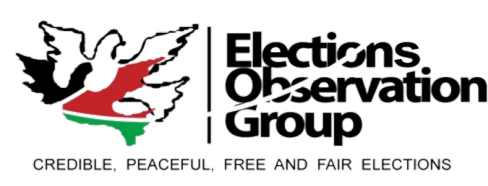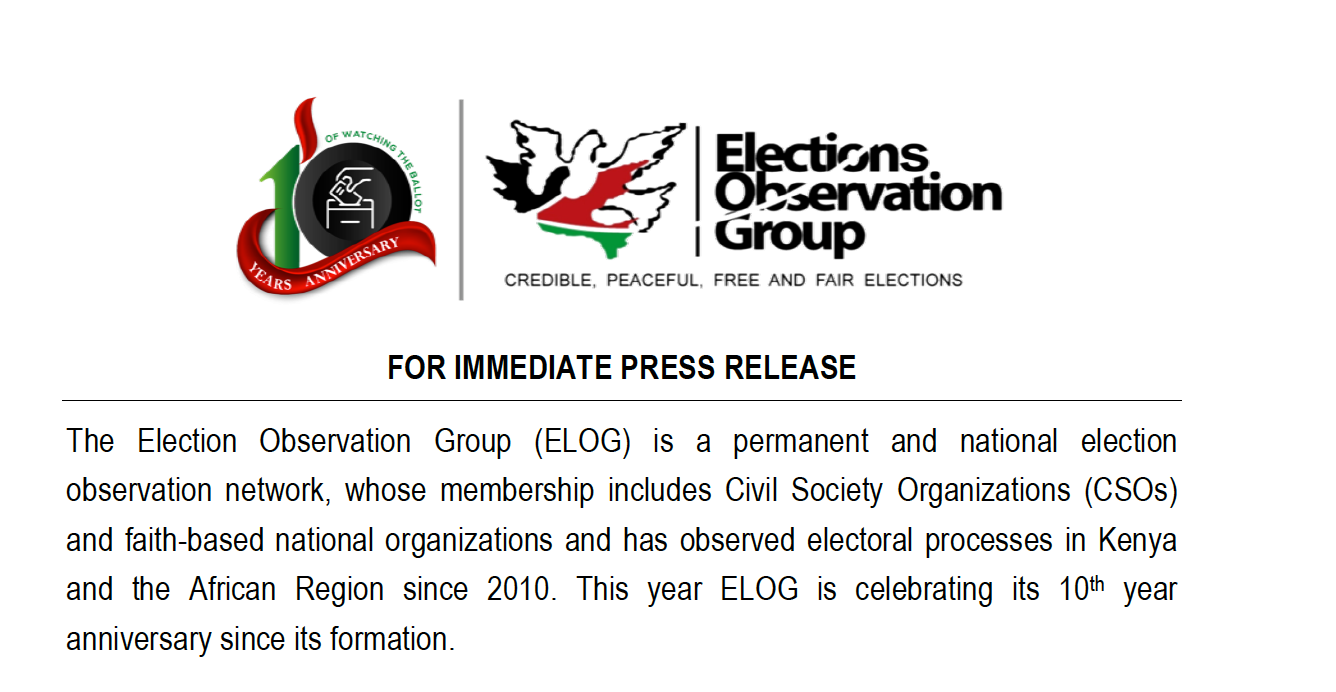ELOG Press Conference on Electoral Preparedness
FOR IMMEDIATE PRESS RELEASE
The Election Observation Group (ELOG) is a permanent and national election observation network, whose membership includes Civil Society Organizations (CSOs) and faith-based national organizations and has observed electoral processes in Kenya and the African Region since 2010. This year ELOG is celebrating its 10th year anniversary since its formation.
Introduction
Using the electoral cycle approach, ELOG has continued to observe the performance of key electoral actors (IEBC, ORPP, Judiciary political parties, Media and Parliament) and monitor continuous electoral processes and other emerging issues in the country and based on these observations would like to make the following recommendations:
1. On Electoral Reforms
Electoral reforms and conversations on the same that had begun in earnest through various platforms like Parliament, Building Bridges Initiative (BBI), the faiths-led Dialogue Reference Group (DRG), Punguza Mizigo Popular Initiative and CSO led initiatives, were slowed down by the outbreak of COVID-19 pandemic thus significantly affecting the timelines and the momentum that had been gained. Further, where critical legislative proposals had been processed, they are still stuck in Parliament. These include the IEBC (Amendment) Bill, Political Primaries Bill, Elections Campaign Finance Bill, Representation of SIG Bill and Referendum Bills among others.
In order to realize comprehensive and timely electoral reforms, ELOG urges:
- Parliament, IEBC, ORPP, PPDT, Political Parties and CSOs to pick up speed and kick start the discussions and build consensus around the necessary electoral reforms.
- Parliament to process and finalize the legislative proposals (bills) before them.
- Other reform proposals including the BBI to be urgently released for public scrutiny and consumption.
2. On Chief Justice’s Advisory to the President on the 2/3 Gender Rule
ELOG has noted with concern the consistent failure by Parliament since 2012, to enact the legislation required to implement the provisions of Articles 27(8) and 81(b) of the Constitution to address gender imbalance despite orders by the Courts and consistent calls by various stakeholders including civil society organizations on this matter. As noted earlier by ELOG, the principles of inclusivity and fidelity to the rule of law are the hallmark of any progressive democratic society and Kenya is no exception.
In order to have this Constitutional/Electoral Principle implemented, ELOG makes the following observation:
- That the directions given by the High Court regarding the petitions challenging CJ’s advice be concluded within reasonable time to end prevailing uncertainties.
3. On the Upcoming By-Elections.
ELOG has noted that the IEBC has scheduled 5 by-elections for December 15, 2020 in Kahawa Wendani, Kisumu North, Lake View, Dabaso, Wundani/Mbale county assembly wards and Msambweni constituency without an attendant communication on the protocols for conducting and observing these by-elections and other electoral processes under a COVID 19 environment.
While circumstances for the postponement of these by-elections were clear and warranted, ELOG urges the following:
- That the Protocols for conducting (by) elections under COVID 19 environment that had been developed and submitted to MOH by the IEBC be finalized and (the same) be subjected to stakeholder discussions before finalization and dissemination.
- That the IEBC to effectively engage with members of the public on these protocols once they have been approved for stakeholder buy-in.
- That the IEBC adopts and begins testing other innovative ways of voting such as electronic and postal voting besides the physical in-person voting to mitigate such emergencies as COVID 19.
4. On Early Political Campaigns
With the next general election still 22 months away, the country is being subjected to what appears to be early political campaigns full of provocative speeches and utterances that are likely to fuel ethnic tension and violence. On 4th of October, for example, two people died as a result of confrontations between rival political factions in Murangá. This was a culmination of continued holding of political rallies by main actors across the country over the last one month. Such activities have been a consistent feature since the last General Elections in the country.
Consequently, ELOG urges as follows:
- The electoral legal framework is clear on the timelines for political campaigns. Any activity outside this framework should be discontinued and action taken on violators.
- Leaders need to exercise political restraint and civic responsibility in their public utterances and meetings.
- All members of the public and political leaders should adhere to the laid down Covid-19 containment protocols. Those found to be violating and flouting these guidelines should be held accountable and necessary action taken against them.
5. On Support to IEBC and PPDT
For the election management bodies like the IEBC and PPDT to effectively prepare and plan for the 2022 elections, support in terms of human and financial resources, should take the form of electoral cycle approach. ELOG has noted with concern that these institutions lack adequate funding and personnel to effectively implement their programs.
ELOG therefore urges:
- Parliament to consider creating independent funding mechanisms for these institutions e.g. IEBC fund, PPDT fund, something similar to the Political Parties Fund contained in the PPA (2011).
- That IEBC Amendment Bill before the house be speedily considered and concluded.
- The Chief Justice to appoint ad hoc members who would enhance the capacity of PPDT to hear and determine cases at the regional levels at least one year before the next general elections.
6. On the Role of Civil Society and Faith Based Organizations (CSOs).
In the recent past, Civil Society and Religious Organizations have come under attack for not being proactive in the simmering political tensions in the country. While ELOG notes legitimate concerns of the issues advanced against CSOs, it is important to appreciate that their operations have been greatly affected by a number of factors including funding and COVID 19 pandemic.
Nevertheless, ELOG urges these organizations to explore alternative and innovative ways of still checking the excesses of the duty bearers so as to effectively be the voice of the people in the various spaces they occupy.
7. On Media
While ELOG appreciates the crucial role that media undertakes in advancing democracy in the republic, concerns have been raised particularly over the publication of pictures, words and actions that are likely to fuel ethnic tension and animosity as well as rising cases of fake news, disinformation and mal-information.
Accordingly, therefore, ELOG urges as follows:
- All media outlets to adhere to the rule of law and their code of conduct.
- II. All media and media users to put in place structures and systems that ascertains and fact-checks information before broadcasting.
Conclusion
The window for sober discussions on the necessary electoral reforms is fast closing especially with the heightened political activities that have been gaining momentum over the last few months. Based on lessons learnt from the last three General Elections in the country, last minute changes to the electoral framework have created mistrust and fomented disagreements between contestants and voters leading to violence and other electoral injustices.
All stakeholders especially the EMBs and duty bearers need to move quickly to consolidate the shared proposals and effect the agreed changes while the opportunity for doing so still exists. ELOG will continue to monitor and regularly share the observation reports with the public and relevant actors.
Signed
ELOG


